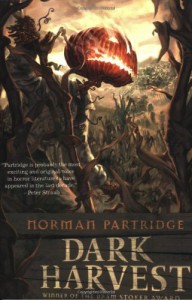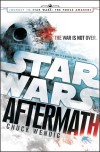Dark Harvest
 Normally, when I finish one book and move on to the next, I make a random selection from a list of what I have to read to determine which one is next. This is to avoid the "last in, first out" problem I normally have when reading books. I'm making an exception with Dark Harvest, since I've read so much good about it, I like a good horror story, and we're making our way toward Halloween. I had to move this one to the top of the list while it was still timely.
Normally, when I finish one book and move on to the next, I make a random selection from a list of what I have to read to determine which one is next. This is to avoid the "last in, first out" problem I normally have when reading books. I'm making an exception with Dark Harvest, since I've read so much good about it, I like a good horror story, and we're making our way toward Halloween. I had to move this one to the top of the list while it was still timely.The story is about Halloween, and an unusual, supernatural ritual that a small town puts on every year. It's reminiscent of "The Lottery" by Shirley Jackson, but it takes the idea behind that story and instead wraps it up in a white-knuckle series of events that teases you with the details of what's going on behind that ritual. You can get more details off the back of the book if you want, or you can do as I did and just read it based on all the good reviews about it and let it surprise you.
For all the good I heard about this novella (it received a starred review from Publishers Weekly, as well as a listing among their top 100 books for that year; it won the Bram Stoker Award the year it was published; and the blurbs in the frontispiece are from well-respected horror authors), as I was reading it, I felt like it was more a run-of-the-mill supernatural story than anything else. But then I reached the halfway point of the book, and I started feeling the hairs on my arms stand up. Not from fear, necessarily (it's been a long time since I've been truly scared by a book), but from knowing that Partridge was taking me places that would surprise me.
The narrative is a little different, with parts of it being told in the second person, as if the narrator is speaking directly to the reader, and there's a certain lack of subtlety to the story. The story is set in 1963, which isn't obvious because of the setting, or the characters, or much else in the story. Partridge mentions a Vincent Price double-feature at the local theater, and one of the characters wears Chuck Taylors, but neither of those tidbits defines 1963; Chucks are still popular, and how unusual would it be for a local theater to show a Vincent Price double-feature around Halloween in 2015? No, the way we know that the story is set in that year is because the narrator keeps telling us so. But once the story takes its turn into the final stretch, all that is ignored.
I've read Partridge before, but it's been so long that I don't remember any of the details about those works, but I do recall that his stories moved along at a breakneck pace. Dark Harvest does, too, and since it's a shorter work, it only makes it fly by more. I finished the book in a couple of hours, and enjoyed the ride. Given the expectations I had going into it, that says a lot. Anyone looking for a good Halloween story should track this down and save it until the 31st to read it in one sitting.






